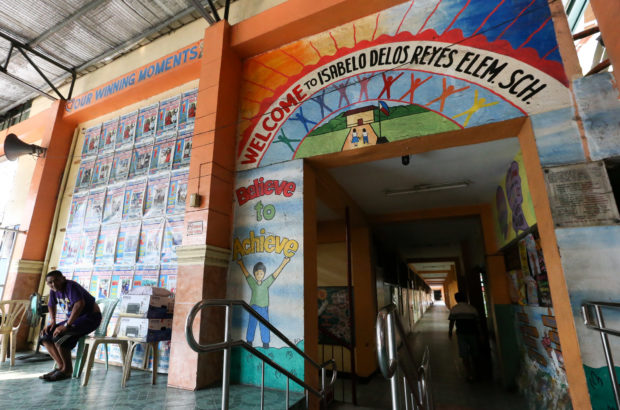DepEd starts monthlong ‘remote enrollment’ on June 1 amid COVID-19 pandemic

SILENT CAMPUS The almost empty Isabelo de los Reyes Elementary School in Tondo, Manila. —LYN RILLON
MANILA, Philippines — Tens of millions of public school students can start enrolling for this school year on June 1, as the Department of Education (DepEd) undertakes an unprecedented and monthlong virtual enrollment in K-12 classes against the backdrop of a global pandemic.
“The first two weeks shall completely be remote enrollment, where there will absolutely be no face-to-face” interactions, the education department said in DepEd Order No. 008, which sets guidelines for the enrollment period.
The order applies even in areas not badly hit by the new coronavirus disease (COVID-19).
Any form of physical enrollment would be allowed in the third week of June, but only if it was coordinated with the local government unit.
“Making physical appearance in school for enrollment purposes shall be the last option for parents or guardians or learners,” said Education Secretary Leonor Briones.
To ease the remote enrollment, students will be contacted primarily by their class advisers from the previous school year who will take care of collecting and entering their data into the End-of-School-Year Learner Information System.
Parents of incoming kindergarten pupils, meanwhile, have been advised to communicate their intent to enroll their children through digital platforms established by schools.
Aside from gauging the number of public school students expected to enroll this school year — which could top last year’s 23 million students given private school transferees — the enrollment period will allow schools to collect data that can reshape what learning looks like in the country.
No face-to-face classes
Briones has said that even as DepEd plows ahead with opening classes on Aug. 24, face-to-face interaction will likely still be prohibited. Depending on their circumstances, schools could offer online classes, printed modules or learning through television and radio.
The Alliance of Concerned Teachers (ACT), the country’s largest teachers’ union, said on Sunday that it welcomed the DepEd order that similarly mandated a work-from-home setup for public school teachers from June 1 to 5.
It added, however, that DepEd had not adequately addressed its concerns regarding mass testing for education workers and the provision of laptops and internet allowance.
“It has yet to issue the comprehensive guidelines on back-to-work arrangements and how safety will be ensured in the workplace,” said ACT secretary general Raymond Basilio.
“If this is any indication of how the government will fulfill its obligations relative to the August school opening, we are in for great dangers.”
ACT also worried that teachers would eventually be forced to report physically to schools, reiterating its call that a wide swath of workers be tested for COVID-19 first.
Exodus from private schools
Private schools throughout the country could lose as many as 2 million students this school year as COVID-19 increasingly restricts families’ ability to spend, according to Joseph Noel Estrada, managing director of Coordinating Council of Private Educational Associations.
The lockdown of more than two months, aimed at controlling the spread of coronavirus, froze many economic activities, leaving many workers unemployed and others to lose their livelihood.
“Prior to the pandemic there was a steady decline [in private school enrollment] that reached 25 percent year in year out,” Estrada said at a virtual Senate hearing on May 21. “But we’re anticipating more.”
There were 4 million private school students in the basic education system last year, compared with 23 million in public schools.
Officials fear the downward trend in private school enrollment will be accelerated by COVID-19 in a way that would be exceedingly difficult to recover from.
Further complicating matters is whether DepEd is prepared to handle a flood of new enrollees given the perennial classroom shortages. As it stands, DepEd was already grappling with how to decongest these spaces in an era of physical distancing.
Cell sites
“Definitely private school kids will either migrate to public schools or will totally drop out,” Education Undersecretary for Planning Jesus Mateo said at the hearing. “How do we ensure that children will continue to learn even if they are at home?”
DepEd is looking into mobilizing parent-teacher associations and envisions a “new role” for parents in education delivery, but it remains to be seen how feasible this would be as many parents will likely juggle homeschooling with finding or retaining employment.
Sen. Grace Poe, meanwhile, appealed on Sunday to President Duterte to address the delay in establishing 50,000 cell sites nationwide by directing concerned state agencies to hasten the construction of telco towers as the country gears for online-based teaching.
In a statement, she said the country lacked the ideal telco infrastructure as it had only some 20,000 towers, far below Vietnam’s 70,000 sites.
The chair of the Senate public services committee also lamented that the Philippines’ average internet speed of 21 Mbps ranked 110th among 174 countries in a recent study by Speedtest Global Index. —WITH A REPORT FROM MARLON RAMOS
Disclaimer: The comments uploaded on this site do not necessarily represent or reflect the views of management and owner of Cebudailynews. We reserve the right to exclude comments that we deem to be inconsistent with our editorial standards.
